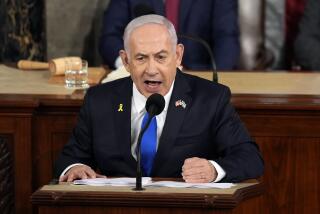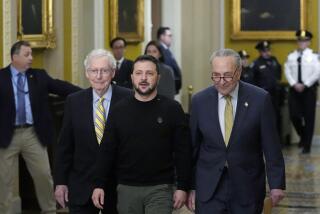Capitol Hill Hails Yeltsin’s ‘Historic’ Visit
WASHINGTON — Russian Federation President Boris N. Yeltsin, disclosing details of his economic reform plans to U.S. lawmakers, told congressional leaders Wednesday that he intends to halve the republic’s contribution to the Soviet military budget.
Plunging into a series of meetings and receptions on the second day of a four-day visit to the United States, Yeltsin declared that his election signals that the Soviet Union’s largest and most important republic has embarked on the road to democracy “and will never turn back.”
Yeltsin, a populist reformer and born-again capitalist who last week became the first leader in Russian history to win office through democratic elections, received a hero’s welcome wherever he went Wednesday. House and Senate members accorded him the honors normally paid only to heads of state, and enthusiastic tourists mobbed him on the steps of the Lincoln Memorial.
While the White House has been reluctant to receive Yeltsin with the same deference it would accord Soviet President Mikhail S. Gorbachev, no such reservations were evident on Capitol Hill.
“Your visit here is historic,” House Speaker Thomas S. Foley (D-Wash.) told Yeltsin.
“The confidence the Russian people have expressed in you gives you an authority and a mandate unprecedented in Russian history,” added Senate Majority Leader George J. Mitchell (D-Me.).
“The people of Russia,” Yeltsin replied through an interpreter, “are ready for democracy, ready for reform. . . . Russia will not leave the path it has chosen.”
In a series of meetings with key members of the House and Senate, Yeltsin spent all morning and much of the afternoon trying to persuade lawmakers to support his reform efforts through increased political and economic ties with the Russian Federation.
While Yeltsin offered few specifics of his reform plans, Sen. John W. Warner (R-Va.), ranking Republican on the Senate Armed Services Committee, said Yeltsin told one group of lawmakers that he plans to cut Russia’s contribution to the Soviet military budget in half.
Another GOP senator, Connie Mack (R-Fla.), said he pressed Yeltsin on the amount of money that Russia gives to Cuba and Afghanistan and was told that the republic is eliminating all contributions to the Soviet foreign aid budget for austerity reasons.
Although such assurances helped win Yeltsin a warm and receptive audience in Congress, lawmakers nevertheless remained cautious about his calls for direct political and economic ties with Russia outside the framework of U.S.-Soviet relations.
The United States can offer “encouragement” but only “limited help,” Mitchell told Yeltsin.
Lawmakers said Yeltsin readily agreed that proposals for a massive package of Western assistance to help the Soviets establish a free-market economy should be tied to specific promises for political and economic reforms. But he argued that much of the assistance should go directly to Russia and the other republics rather than to Gorbachev’s central government.
Wednesday night, at a dinner attended by Vice President Dan Quayle, Yeltsin said: “Do not finance bureaucracy, either central or Russian. If you wish Russia well, invest in what people do for themselves.”
He said the Soviet Union most needs America to target its investments in ways that will help the country develop a free market economy.
Throughout the day Yeltsin stressed that he was “not here to look for money.” And if he was disappointed by the caution voiced by lawmakers on the question of aid, he did not show it.
According to officials traveling with the Russian leader, the visit already is well on its way toward accomplishing the main goal Yeltsin set for himself--bolstering his image as a world leader with whom the West should deal on the same level as Gorbachev.
In his talks on Capitol Hill Wednesday, in meetings with President Bush and several Cabinet members today, and in discussions he will hold with business leaders in New York on Friday, Yeltsin will have done much to erase the negative impression he made on his first visit to the United States two years ago. On that trip, he showed up late for appointments and was reported to have been drinking heavily.
“Boris is behaving himself this time. He has matured,” said one Russian who requested anonymity.
But if it was Boris the statesman who wooed lawmakers on Capitol Hill, it was Boris the populist who plunged into a crowd at the Lincoln Memorial. With the politician’s consummate skill for recognizing a photo opportunity, Yeltsin strode into the crowd of about 1,000 tourists lining the steps of the memorial, shaking hands, posing for pictures, flashing victory signs and picking up and kissing at least three babies.
More to Read
Get the L.A. Times Politics newsletter
Deeply reported insights into legislation, politics and policy from Sacramento, Washington and beyond. In your inbox three times per week.
You may occasionally receive promotional content from the Los Angeles Times.










